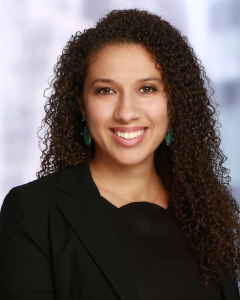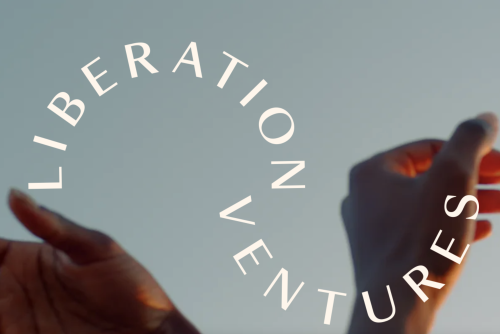We’ve entered into Civic Season—the timeframe between Juneteenth and Fourth of July. For many years, July 4th has been the only recognized Independence Day in The United States. However, in 2021, our government passed a bill to solidify June 19th, a.k.a. Juneteenth, as a federal holiday. This watershed moment has provided us with an opportunity to reckon with our past and reflect on why there’s a need to acknowledge two Independence days in America. Juneteenth in particular is a time when many Black Americans acknowledge the history of enslaved Black people, honor their ancestors and traditions, and celebrate Black progress. Moreover, this is a time when many people are reminded that repair is an ongoing responsibility we all carry.
In a timely interview with National Civic Collaboratory member and Liberation Ventures Co-Founder and Managing Director, Aria Florant, we sat down (virtually)to discuss her powerful organization– Liberation Ventures–and the work they are doing to accelerate the Black-led movement for racial repair. Read on to learn more about the birth of Liberation Ventures, how Aria sees this work of cultural repair as required to build a true multiracial democracy, and what she’s learned from our Civic Collaboratory mutual-aid model.
Meet Aria Florant 
Aria Florant began her career as a local organizer and nonprofit practitioner in East Palo Alto, California. In 2014, she started her graduate studies, which happened to begin a few weeks after the killing of Michael Brown. In response, she activated her civic power as a graduate student activist. Fast forward to today and she’s catalyzing true change to push the Black reparations movement forward.
Q&A with our friend Aria:
Q: Tell us about your background and how you arrived to today.
A: I’m Aria Florant. I use she/her pronouns. I am originally from Colorado, but currently living in Brooklyn. I’ve been doing racial equity and justice work my entire career.
I feel like I saw racial equity work happening in a ton of different arenas, and over time got to the point where I felt like there were a lot of really innovative solutions being targeted toward the symptoms of racial injustice, but felt like I was seeing fewer interventions that were really directed at root causes.
…this country’s inability to face its origin story and to repair the trauma of that past feels like a really important root cause of why so many of our systems are still inequitable.
We ended up landing on reparations as the thing that we wanted to be focused on, and specifically, we felt that’s not just financial but it’s also non-financial. It’s wealth disparities and anti-black narratives that encompass the root causes of the injustice that we see, and so we believe that a comprehensive reparations program shocks the system on both of those things so that it’s not just about money.
It’s about really changing the way our culture approaches repairing the past.
Q: Where are you headed?
A: Our official mission statement is to accelerate the Black-led movement for racial repair in the US and concretely that means that we support organizations across the country that are building momentum toward federal reparations, which is our north star. At the highest level, our work is really about building a culture of repair, because we think that that’s what’s needed to not only get us to the point where we can win comprehensive reparations policy, but also create the cultural change that will make that policy durable.
Q: Why is culture building important to supporting a policy long term?
A: There are many ways to think about culture and what culture really means. Obviously, norms, values, practices, etc. I used to do culture change work within organizations and there’s a framework we would use to change culture. You need to do four things.
- Leaders need to be role modeling the culture that you want — so that’s one: role modeling.
- Second is building the skills to operate in a new way with the new cultural norm.
- The third is building reinforcement mechanisms for those norms — making sure that people are being incentivized to act according to the cultural norms you want to see.
- Then the last thing is fostering understanding and conviction. People need to understand why it’s so important.
“We want to live in a world where everybody knows how to repair harm when it gets caused. We often talk about it as, we want to build a repair-literate society, where we’re not constantly afraid of owning up to the truth and apologizing.”
If you ask me, what does it mean to have a culture of repair? It means that we live in a society that has the will and skill to repair harm any time it is caused. And as a result, we all get to belong as our whole selves. The alchemy of belonging across differences is celebrated.
Q: How do we have the courage to make the impossible possible? What does that courage look like for you and how would you invite that for others?
The courage comes from knowing that I am completely on purpose — standing in my truth related to what I believe this country needs.
A: I am the daughter of a White mom and a Black dad. I’ve operated in very white spaces, and very black spaces. When you live in that in between, you can see the problem in a different light because you’re existing at the inflammation point. Experiencing that is how I know where I think the country needs to go. That’s what gives me the most fulfillment and gratitude in this job — knowing that there’s nothing else I could be doing that would be closer to my purpose. But don’t get me wrong, it is still really hard – not only the specific content of the work, but just being an entrepreneur and building an organization.
I think you have to have a lot of courage to do both of those things to take on the risk. Of course we may fail, and we are trying to do something that we don’t know how to do. We are learning how to do it as we go just like so many big, impactful, at-scale movements have done. It is also a really important part of being able to have courage, you have to be in a very clear posture of being a learner and being humble about what you don’t know, and being willing to wade into something without having all the answers.
Some people look at me like I’m crazy because I’m working on reparations. They think that it’s not possible. They think that other people will look at them crazy if they go out and start talking about this. But I’m in the data every day, and I know there are really clear signs of progress: support for reparations has doubled in the last two decades. Imagine what we could do over the next 20 years if this movement was actually well resourced.
Q: What role has Citizen University’s National Civic Collaboratory played? What lessons can be learned from this kind of network?
A: To me, Civic Collaboratory is fundamentally about building strong relationships that can then blossom into collaboration. The power of relationships is actually infinite. There is no limit to the depth and the strength and the quantity and the quality of our relationships. But also in particular, across race and across other lines of difference, there is a unique power in that.
Yes, you need strong leaders and strong institutions and resources. But you need that connective tissue in between in order to create a context where everything is adding up to more than the sum of its parts, and as a field catalyst, our role is to help create the conditions for that to happen. Civic Collaboratory has inspired me because I think it is a model that can help build the capacity of the entire field through strengthening the bonds between different players.
